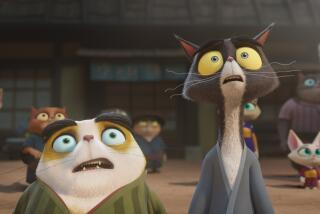Movie review: ‘Straw Dogs’
Writer-director Rod Lurie’s bird-brained remake of “Straw Dogs” doesn’t work on its own terms, and it can’t hold a candle to the unruly, unstable merits of Sam Peckinpah’s 1971 original. It’s miscast, barely functional in terms of technique, stupid and unnecessary. Other than that....
Seriously: Why remake this combustible property unless you have something to say about violence other than “whatever works”? Lurie settles for relocating the story from a village of rapists and cretins in Cornwall, England, to small-town Mississippi and a related breed of same. The double sexual assault endured by the female protagonist is again the linchpin, though this time the climactic slaughter is treated as a “Saw”-ed-off shotgun joke with no serious indictments in any direction, least of all toward the once-emasculated, newly animalized male lead.
Instead of a pacifist Vietnam War-era American mathematician living (hiding?) abroad, played by Dustin Hoffman, our protagonist is a pretty-boy Hollywood screenwriter portrayed by James Marsden. His wife is a TV actress played by Kate Bosworth, the once and future hometown queen of the town of Blackwater, whose citizens believe in God, football and guns. The couple in the ’71 film were grimly mismatched, thereby giving the story some fascinating tension from the outset. The new “Straw Dogs” marrieds go together in the blandest possible way.
The town’s former high school gridiron hero (Alexander Skarsgard), now working as a contractor on the couple’s post-Katrina rehab, cannot think straight when his ex-girlfriend (married to the godless milquetoast liberal writer) goes jogging braless. Every fevered glare points to the assault to come. “Are you saying I’m asking for it?” the Bosworth character says to her husband early on, appalled. Lurie gives Bosworth lines such as this to make her a more progressive, enlightened object of desire. This marks a change from the misogynist implications in Peckinpah’s version, at least to many: that she was asking for it.
Peckinpah’s film, however, is more provocatively complicated than its reputation. In the post-assault sections of the original, the wife’s trauma was vividly realized on screen. Lurie and his editor try some of that same eye-blink flashback strategy, but it’s a mess — all affectation and no intuition. Marsden and Bosworth are flyweight presences on screen. James Woods, as the perpetually raging ex-coach who lights the fire that sets this corner of Mississippi burning, again, brings every kind of overacting he can bring to little avail. Only Skarsgard lends some detail and scary subtlety to a role that does not invite them.
More to Read
The biggest entertainment stories
Get our big stories about Hollywood, film, television, music, arts, culture and more right in your inbox as soon as they publish.
You may occasionally receive promotional content from the Los Angeles Times.










